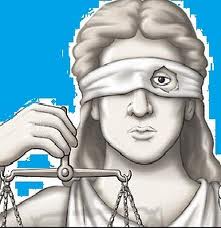What happened to Tim’s “day in court?”

Tim was convicted of two serious felonies, but was not allowed to defend himself in court. How does that work? What happened to justice? Why wasn’t Tim allowed to explain why he bid on the BLM leases?
When a defendant is charged with a crime, the way it is supposed to work is that the prosecution must first prove, “beyond a reasonable doubt” that the defendant is guilty of the crime. After the prosecution meets this burden, the defense gets to:
- Show s/he did not do it, by showing the flaws in the prosecution’s case, and by presenting evidence that the defendant did not physically do it. (Here, that was never an issue. Tim has always admitted to bidding on the leases). Or;
- show that, although he the act, he did not actually intend to commit the crimes he was charged with (more an intent in later blog), or;
- S/he has a defense — a reason why s/he did the crime, that would make him or her actually not guilty. In legalese, this is called an “affirmative defense.” There are a handful of affirmative defenses, such as duress, self-defense, and so on.
The one that Tim wanted to present is the Necessity or Choice of Evils affirmative defense that allows a person to explain that he or she chose to break a law in order to prevent an even greater harm. The typical analogies we use in law school to teach this defense is the case of a person who breaks into a burning building to save a child, or demolishes a home to make a firebreak. That person would be not guilty of breaking and entering, or arson, because her acts prevented a greater harm. Here DeChristopher disrupted what we now know was an illegal auction to prevent the destruction of the climate which makes our planet habitable for human life.
The prosecution in Tim’s case anticipated that we would present this defense, so over a year before the trial even happened they asked Judge Benson to prevent Tim from doing it. The prosecution used a pre-trial procedure called a “Motion in Limine,” when, if granted, absolutely bars the defendant from even mentioning the defense in front of the jury. Judge Benson granted the prosecutions Motion in Limine in the Fall of 2009.
Why did the court say DeChristopher can’t even try to prove his defense of Necessity?
The reason is political: the American legal system does not want political actors or “civil disobedients” to be able to be found not guilty of crimes they commit in protesting the government. This is especially true in federal courts. It is crucial to note that not all common law countries work that way. (Common law is the legal system created in England and used in all of its former colonies). In England, for example, the courts tend to especially allow the Necessity Defense in political trials because it is seen as an exercise of one’s political and civil rights as citizens. Also, common law systems have a very strong bias against keeping defenses from juries.
The power used to enact this silencing is legal: The prosecution argued and the judge agreed that Tim did not meet the elements of the Necessity Defense. they are:
- The defendant was faced with a choice of evils and chose the lesser evil;
- The defendant acted to prevent imminent harm;
- There was a causal relationship between DeChristopher’s conduct and harms to be averted; and
- The defendant had no legal alternatives to violating the law.
The way it works in England, and should work here, is that the jury decides if the defendant has satisfied all of these elements. Here, the prosecution asked the judge to decide before hand if a “reasonable juror” would (read:should) believe that the facts of Tim’s case satisfy these elements. The prosecution in its Motion in Limine argued that to let the jury hear this defense would cause needless delay and confusion, and could even result in the jury finding Tim not guilty by applying the Necessity Defense wrongly, without the elements being really met. Even though the jury is supposed to determine the facts while the judge determines the law, the prosecution asked the judge to decide, as a matter of law, that it would be impossible for a reasonable jury to find Tim not guilty by reason of Necessity.
According to Judge Benson, Tim didn’t meet any of the elements. Tim’s “monkey-wrenching” the auction was not a lesser evil than what the BLM was doing. The harm (climate change) was not imminent. Tim’s act could not cause the harm to be averted, even assuming there was any harm. And finally, Tim could have done something legal to prevent the alleged harm, like write a letter to his congressperson or click a link on the internet.
The result of this pre-trail ruling was that Tim was gagged. He could not present his defense. Even if he had tried to mention anything like “I am fighting against climate change” or “the BLM auction was illegal,” the judge would have stopped him in his tracks. The judge could find him and his lawyers in contempt, or even declare a mis-trial and seat another jury, constricted in the same way. All Tim and his defense counsel could do, or can do, is to appeal Judge Benson’s ruling on the Necessity Defense to a higher court.
What do you think about the law in this case? Do you have any questions, or anything to add? Do you think we should appeal? Will it do any good? Post your comments and I will respond.
Rebecca Hall is a Professor of Law and History, and a life-long activist.
Leave a Reply